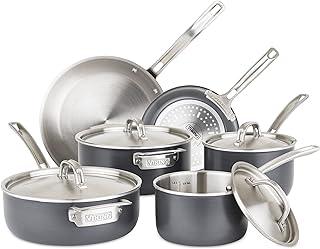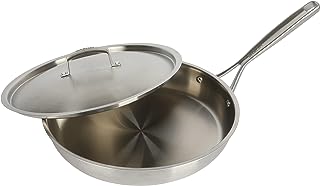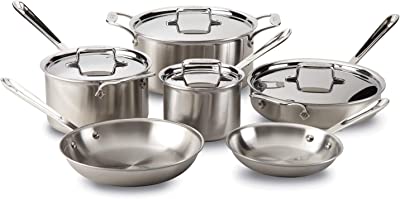Battle of the Cookware: Cast Iron vs Stainless Steel

Are you in the market for new cookware but unsure of which material to choose between cast iron vs stainless steel? Look no further, as we provide a comprehensive guide to help you make an informed decision. We will take a deep dive into the benefits and disadvantages of both materials, their cooking performances, durability, maintenance, heat conduction and retention, oven-safety, cooktop compatibility, and price. We will also discuss when to use each type of cookware and list the pros and cons of both options. Don’t forget to stick around till the end where we provide our top 5 picks for both cast iron vs stainless steel cookware. So let’s get started on this battle of the cookware!
Introduction
Cast iron vs stainless steel are two highly sought-after materials for cookware. Both have their unique advantages and disadvantages, making it challenging to choose between them. While cast iron is lauded for its heat retention and durability, stainless steel is known for its sleek look and easy maintenance. Ultimately, the decision between the two will come down to personal preference, cooking style, and budget. In this overview of cast iron vs stainless steel, we’ll explore the differences in cooking performance, durability, maintenance and cleaning, heat conduction and retention, oven-safety, cooktop compatibility, and price to help you make an informed decision.
Overview: Cast Iron vs Stainless Steel’s Benefits and Disadvantages
When it comes to choosing between cast iron vs stainless steel cookware, it’s essential to consider their respective benefits and disadvantages. Cast iron offers excellent heat retention and even cooking, making it perfect for high-heat meals like seared steaks and crispy fried chicken. However, it requires seasoning and proper maintenance to prevent rusting. On the other hand, stainless steel is easy to clean, lightweight, and looks modern, but may not offer the same cooking performance as cast iron in terms of heat distribution. Ultimately, the choice between these two materials depends on your personal preferences, cooking style, and budget.
Understanding Cast Iron vs Stainless Steel Cookware
When it comes to understanding the difference between cast iron vs stainless steel cookware, it’s important to consider their unique properties. Cast iron is known for its exceptional heat retention and durability, making it ideal for high-heat cooking and dishes that require even heat distribution. However, it can be heavy and requires seasoning and proper maintenance to prevent rusting. On the other hand, stainless steel cookware is lightweight, easy to clean, and great for low-heat cooking. It’s also non-reactive and can handle acidic foods well, making it a great option for those who want a modern look with easy maintenance. Ultimately, the choice between cast iron vs stainless steel will depend on personal preference, cooking style, and budget.
An Overview of Cast Iron Cookware
Cast iron cookware has been a staple in kitchens for centuries, known for its durability and versatility. Made from a mixture of iron, carbon, and silicone, cast iron cookware is often coated with enamel to prevent rusting. Before use, seasoning the cookware creates a non-stick surface that can withstand high-heat cooking on the stovetop or in the oven. The best part? Cast iron cookware adds a unique flavor to dishes that other materials simply cannot match.
An Overview of Stainless Steel Cookware
Stainless steel cookware is a popular choice for many home cooks and professional chefs due to its durability, non-reactive nature, and ease of cleaning. Its ability to distribute heat evenly makes it ideal for searing, sautéing, and frying. Unlike cast iron, it doesn’t require seasoning before use and won’t rust or corrode. It’s also oven-safe, allowing for versatility in cooking methods. However, stainless steel may not retain heat as well as cast iron and can be more expensive. Overall, stainless steel cookware is a reliable option for those seeking long-lasting, easy-to-maintain cookware.
Differences Between Cast Iron vs Stainless Steel Cookware
When it comes to cookware, choosing between cast iron vs stainless steel can be a daunting task. Both materials have their unique advantages and disadvantages. Cast iron retains heat longer and distributes it evenly, making it ideal for recipes that require long cooking times. On the other hand, stainless steel heats up quickly, making it better suited for searing or sautéing. Additionally, cast iron requires seasoning before use to create a non-stick surface, while cleaning and maintaining stainless steel is relatively straightforward. Ultimately, the choice between cast iron vs stainless steel depends on personal preference and intended use.
Cooking Performance
Cooking performance is a critical aspect to consider when deciding between cast iron vs stainless steel cookware. Cast iron excels at even heating and browning, making it perfect for dishes that require high heat cooking, such as searing or frying. However, stainless steel heats up quickly and evenly, which makes it better suited for recipes that require precise temperature control. It’s important to keep in mind your personal cooking preferences and the type of food you like to cook when deciding which cookware to use. Ultimately, both cast iron vs stainless steel have their strengths and can produce excellent results in the kitchen.
Durability
When it comes to durability, both cast iron vs stainless steel cookware have their own strengths. Cast iron is well-known for being incredibly durable and long-lasting, often passed down through generations as a treasured family heirloom. With proper care and seasoning, cast iron can last a lifetime. Stainless steel, on the other hand, is also quite durable but may not hold up as well over time with heavy use. However, stainless steel is more resistant to rust than cast iron vs requires less maintenance overall. Ultimately, the choice between these two cookware materials boils down to personal preference and cooking needs.
Maintenance and Cleaning

Proper maintenance and cleaning are essential for both cast iron vs stainless steel cookware. Cast iron requires special care and attention to prevent rusting and maintain its seasoning. It is recommended to avoid using harsh soaps and scrubbers while cleaning cast iron, as it can damage the seasoning. On the other hand, stainless steel is generally easier to clean and maintain, as it is more resistant to rusting or staining. Unlike cast iron, it does not require periodic re-seasoning and can be used for a wider variety of cooking methods without losing its non-stick properties. Ultimately, the choice between cast iron vs stainless steel cookware will depend on your personal preferences and cooking needs.
Heat Conduction and Retention
When it comes to heat conduction and retention, cast iron cookware has a clear advantage over stainless steel. Cast iron is renowned for its ability to distribute heat evenly and retain it for longer periods, making it an excellent choice for dishes that require a consistent temperature throughout cooking. In contrast, stainless steel heats up quickly but doesn’t retain heat as well as cast iron, which can make it challenging to achieve a crispy crust or sear meats properly. Ultimately, the choice between cast iron vs stainless steel cookware will depend on personal preference and cooking needs.
Oven-Safe
Both cast iron vs stainless steel cookware can be used in the oven, but there are a few differences to keep in mind. Cast iron is known for its ability to retain heat, making it ideal for dishes that require longer cooking times. It is also more durable than stainless steel and can withstand high temperatures without warping or cracking. In contrast, stainless steel heats up faster and is better suited for quick-cooking dishes that require precise temperature control. When choosing between the two, consider the type of cooking you will be doing and the temperature requirements. Overall, both cast iron vs stainless steel offer great options for oven-safe cookware depending on your individual needs.
Cooktop Compatibility
 | Babish Cast Iron Preseasoned Skillet, 12-Inch |
Cooktop compatibility is an essential factor to consider when choosing between cast iron vs stainless steel cookware. Cast iron cookware is compatible with all types of cooktops, including gas, electric, and induction. Meanwhile, stainless steel cookware may not work on induction stovetops unless it has a magnetic base. However, both materials have their unique benefits that make them suitable for different styles of cooking. Cast iron’s ability to retain heat makes it perfect for searing meat or cooking dishes that require high temperatures. On the other hand, stainless steel heats up quickly and can reach higher temperatures than cast iron, making it ideal for delicate foods like fish and vegetables. When deciding between cast iron vs stainless steel cookware, it’s crucial to consider your cooktop type and the style of cooking you plan to do.
Price
When it comes to choosing between cast iron vs stainless steel cookware, price is a significant consideration for many. Cast iron cookware is generally more affordable than stainless steel, making it an attractive choice for budget-conscious cooks. However, cast iron requires seasoning and proper maintenance to prevent rust and ensure longevity, which may add to the overall cost over time. On the other hand, while stainless steel cookware is typically more expensive due to its durability and resistance to corrosion, it is easier to clean and can be used with acidic ingredients without imparting a metallic taste. Ultimately, the choice between cast iron vs stainless steel cookware will depend on personal preference, cooking needs, and budget.
When to Use Cast Iron vs Stainless Steel Cookware
 | Viking Culinary Professional 5-Ply Stainless Steel Cookware Set, 10 Piece, Dishwasher, Oven Safe, Works on All Cooktops including Induction |
When deciding between cast iron vs stainless steel cookware, it’s essential to consider the cooking method you’ll be using. Cast iron is great for dishes that require high heat and slow cooking, such as stews and braises. It retains heat well, making it ideal for dishes that need to stay warm for a more extended period. On the other hand, stainless steel is perfect for dishes that require quick cooking, such as sautéing or searing. Its non-reactive properties make it an excellent choice for preparing acidic foods like tomatoes or citrus. Ultimately the decision between cast iron vs stainless steel will depend on your personal preferences and cooking needs.
Pros and Cons of Cast Iron Cookware
Cast iron cookware is a popular choice among home cooks due to its durability and versatility. This type of cookware can retain heat well, making it ideal for searing meats and vegetables. Additionally, cast iron cookware can be used on any stovetop, including induction cooktops. However, cast iron requires seasoning before use to prevent rust and maintain its non-stick properties. Furthermore, this type of cookware is heavy and may not be suitable for those with mobility issues. Finally, cast iron can react with acidic foods like tomatoes or citrus, altering the flavor of the dish. Considering these pros and cons will help you decide if cast iron is the right choice for your cooking needs.
What are the benefits of using cast iron for cooking?
Cast iron is a popular choice for cooking because it offers several unique benefits, including:
1. Even heating: Cast iron distributes heat evenly across its surface, allowing food to cook uniformly and reducing the risk of hot spots.
2. Non-stick surface: With proper seasoning and care, cast iron develops a natural non-stick surface that makes cooking and cleaning easier.
3. Versatility: Cast iron can go from stovetop to oven to grill, making it a versatile tool in the kitchen.
4. Durability: Cast iron is extremely durable and can last for generations with proper care.
5. Adds Iron to Your Diet: Cooking with cast iron adds small amounts of dietary iron into your food which is beneficial for people who are deficient in this nutrient.
These benefits make cast iron an excellent choice for everything from searing steaks to baking cornbread, making it a staple in many kitchens around the world.
Pros and Cons of Stainless Steel Cookware
Stainless steel cookware is a popular choice among home cooks and professional chefs alike. One of the biggest advantages of stainless steel cookware is its durability and longevity. It can withstand high heats, won’t warp or scratch easily, and doesn’t require any special care like seasoning. Additionally, stainless steel is non-reactive, meaning it won’t interact with acidic foods and alter their taste. Cleaning stainless steel cookware is also a breeze, making it an attractive option for those who prioritize convenience in the kitchen.
Why should I use stainless steel over vs cast iron for cooking?
Stainless steel is generally more durable and corrosion-resistant than cast iron, which can be prone to rusting if not properly cared for. Stainless steel also heats up more quickly and evenly than cast iron, making it a good choice for cooking foods that require precise temperature control, such as delicate sauces or fish.
When compared to cast iron cookware, however, there are some drawbacks to consider. Stainless steel doesn’t distribute heat as evenly as cast iron, which may result in hot spots or uneven cooking. Additionally, stainless steel cookware can be more expensive than other materials, making it less accessible for some consumers. Despite these limitations, many people choose stainless steel cookware for its durability and ease of use in the kitchen.
Final Thoughts on Choosing Between Cast Iron vs Stainless Steel Cookware
When it comes down to choosing between cast iron vs stainless steel cookware, there are several factors to consider. Both types of cookware have their unique advantages and disadvantages. Cast iron is excellent for even heat distribution and dishes that require high temperatures, while stainless steel is durable, easy to clean, and offers a modern look. Ultimately, your choice between the two will come down to personal preference, cooking style, and budget. It’s important to weigh all the options before making a decision so you can choose the best cookware for your needs.
Top 5 Cast Iron Pans
 | Babish Cast Iron Preseasoned Skillet, 12-Inch |
Cast iron cookware is a must-have for any kitchen, and the top-rated cast iron pans are no exception. They offer a non-stick surface when seasoned properly, making cooking and cleaning a breeze. Additionally, cast iron pans are known for their durability and ability to distribute heat evenly, ensuring that your food cooks perfectly every time. Among the top-rated cast iron pans, the Lodge Cast Iron Skillet stands out as an excellent choice due to its versatility and all-around performance. Another great option is the Le Creuset Signature Iron Handle Skillet, which features an enamel coating that makes it easy to clean. Ultimately, the choice between these top-rated cast iron pans will depend on personal preference and cooking needs.
Top 5 Stainless Steel Cookware
 | Babish 12 Inch Stainless Steel Triply Professional Grade Fry Pan w/ Stainless Lid |
When it comes to reliable and long-lasting cookware, stainless steel is an excellent choice. One of the main benefits of using this type of cookware is that it is incredibly durable and resistant to wear and tear. In fact, it can last a lifetime if taken care of properly. Additionally, stainless steel cookware offers a sleek and modern look that can enhance the aesthetic appeal of any kitchen. Brands like All-Clad, Cuisinart, and Calphalon are known for their high-quality stainless steel cookware options that are perfect for both novice and professional chefs alike.
References and Additional Resources
When choosing between cast iron vs stainless steel cookware, it’s essential to consider your individual cooking needs. Both types of cookware have their advantages and disadvantages, so it’s crucial to weigh the pros and cons before making a decision. To learn more about cast iron vs stainless steel, there are several resources available that can help. Cookbooks, online forums, and product reviews are just a few examples of additional resources that can be used to ensure you make an informed decision when selecting your cookware.
Conclusion

In conclusion, both cast iron vs stainless steel cookware have their own benefits and disadvantages. While cast iron is great for searing, baking, and frying, stainless steel is more versatile when it comes to cooking methods like sautéing and simmering. Cast iron requires a bit more maintenance but can last a lifetime if taken care of properly. Stainless steel is easier to clean but may not retain heat as well as cast iron. Ultimately, the choice between the two will depend on personal preference and cooking needs. To explore the best options available in the market today, check out our top 5 cast iron pans and stainless steel cookware recommendations.




